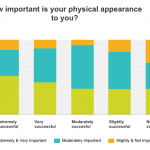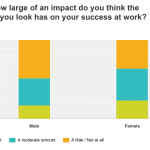What business does body image have in the workplace? A lot, according to our recent healthcare survey.
We worked with Lisa Himmel, co-author of Hungry: A Mother and Daughter Fight Anorexia, to perform a medical research study on people’s body image and workplace habits.
Himmel, who’s working on her next project, used SurveyMonkey Audience to reach 300 employed Americans. She wanted to determine how much an employee’s focus on their appearance affects their perceived success, attention, and overall happiness in the workplace. And when it comes to self-esteem and business success, the results may surprise you.
The (un)importance of appearance
First thing’s first. How do people view themselves? And how often are they thinking about how they look? On the whole, people tend to care about their physical appearance. 50% say that their appearance is moderately important to them, while 39% say it’s either very or extremely important to them. (That leaves only 11% who say it’s slightly or not at all important.)
So how do the nearly 40% of people who say their appearance is very or extremely important to them fare at work versus those who don’t think it’s as important?
When we compared people who answered the question, “How successful do you consider yourself in your career?” with those who answered the question, “How important is your physical appearance to you?” we found that people who consider themselves to be successful are more likely to say that their physical appearance is important to them.

But does placing an importance on appearance have a measurable impact on success? You be the judge. People who say their appearance is very or extremely important to them are more likely to:
- Say their career is extremely important to them
- Think about the way they look always or most of the time while they’re at work
- Believe that the way they look has a great deal of an impact on their success at work
But they’re less likely to:
- Think they always get the credit they deserve for accomplishments they’ve achieved at the office
- Be extremely or very proud of their career compared with those who think their appearance is only moderately important
- Have received a raise or promotion in the last year: 35% received a raise or promotion, compared with 52% of those who say their appearance is only moderately important to them
Thinking about how you look all the time may give you less time to think
So the majority of people say that their appearance is at least moderately important to them. But does that mean they’re aware of their appearance all day? When we asked, “How often do you find yourself thinking about the way you look?” 62% of people say they sometimes think about how they look. A quarter of respondents say they think about it most of the time, and even fewer say they always think about how they look (5%).
And what about while they’re on the job?

49% say they sometimes think about the way they look while they’re at work, followed by 25% who say they rarely do, and 18% who say they do most of the time.
So when it comes to work success and happiness, it seems like moderation is key. The people who sometimes think about the way they look at work seem to come out on top, as they’re more likely to:
- Have received a promotion or raise in the last year
- Feel proud about their career
- Have an annual household income of $150,000+
- Say they’re extremely or very focused at work
Self-esteem and success
Okay. The importance of appearance (and time thinking about one’s appearance) aside, how does self-esteem fit into business success? Even though most people say their appearance is important to them, and that they’re thinking about their bodies at least some of the time, they’re not feeling great about how they look:
- Less than 1% say they’re extremely proud of their body, with only 10% saying they’re very proud
- Nearly half (40%) say they’re moderately proud
- It was an even split between those who say they’re only slightly proud (25%) or not at all proud (25%) of their body
And it looks like feeling proud is related to the kind of success that can be measured salary-wise. Take a look:

18% of people who are extremely or very proud of their body report that their average household income is $150,000 or more, which is higher than in any other income bracket. And the majority of people who report an average household income of $25,000-$49,000 say they’re only slightly or not at all proud of their body (56%).
Also, when it comes to a raise or promotion, 54% of those who are at least moderately proud of their body have received a raise or promotion in the past year, compared with 46% of those who aren’t proud of their body.
Does gender make a difference?
When we compared how women and men answered the survey, the results didn’t show significant gaps at first. On average, women answered questions about the importance of their career, how successful they consider themselves to be, and how focused they are at work—just about the same as men.
However, women are a bit more image-conscious than men. 46% say their physical appearance is extremely or very important to them (while 33% of men say the same). And although women aren’t thinking about the way they look at work that much more than men, they’re more likely to think appearance plays a role in work success:

Additionally, 48% of men say that they feel they get the credit they deserve for their work accomplishments always or most of the time, compared to 37% of women.
We also learned that women are less likely to be at least moderately proud of their body or more (43% compared with 59% of men). So it makes sense when we look back at the data showing that 54% of those who are at least moderately proud of their body have received a raise or promotion in the past year, compared with 46% who aren’t. Because only 48% of the women in our survey say they received a raise or promotion in the past year, compared with 55% of men.
All-in-all, there’s something to be said for moderation in many things, especially when it comes to how often you’re thinking about how you look and how important your appearance is to you. So take a good look in the mirror—but not for too long, unless you’re focused more on what’s on the inside than on what’s out.
Many thanks to Lisa for her help on this project. And if any of you are running a research study with SurveyMonkey, give us a shout in the Comments below. We’d love to learn more!




